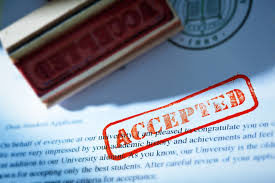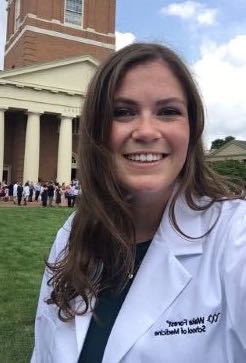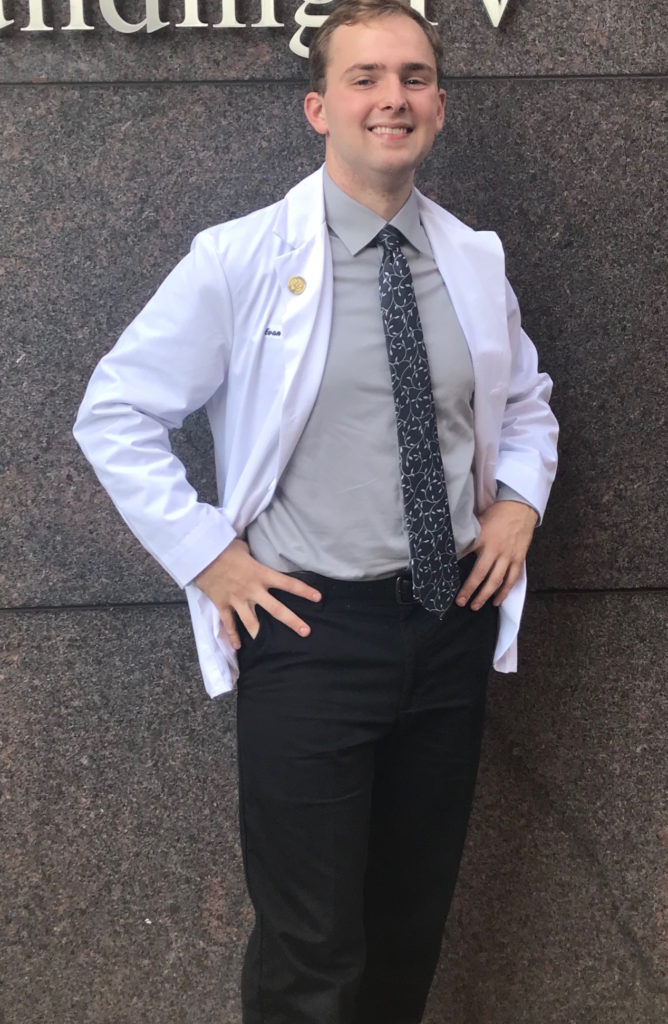MEDICAL SCHOOL: THE FIRST YEAR

BY GRANT MERCER – Last year over 52,000 students applied to U.S. medical schools, with just under 40% offered admission. This year Stethoscope Magazine will be following three of these accepted students as they make their way through the first year of medical school. Meet these students below and join us as we follow them on this journey.
 ANDREW HEY – Andrew is attending the University of Louisville School of Medicine. Louisville’s class of 2022 is quite diverse, ranging in age from 19 to 32. The 163 students were selected from a pool of over 3,500 applicants, from 18 different states and 58 different undergraduate universities. Louisville School of Medicine is renowned for its medical innovations including implantation of the first fully self-contained artificial heart, the first successful hand transplant, and discovering embryonic-like stem cells in adult human bone marrow.
ANDREW HEY – Andrew is attending the University of Louisville School of Medicine. Louisville’s class of 2022 is quite diverse, ranging in age from 19 to 32. The 163 students were selected from a pool of over 3,500 applicants, from 18 different states and 58 different undergraduate universities. Louisville School of Medicine is renowned for its medical innovations including implantation of the first fully self-contained artificial heart, the first successful hand transplant, and discovering embryonic-like stem cells in adult human bone marrow.
Andrew, a native of Lexington, Kentucky, earned a degree in neuroscience (complete with honors). As an undergraduate, he shadowed medical school classes at Vanderbilt, learning early on about the demanding schedule required of medical students. He also took undergraduate classes in neuroanatomy and gross anatomy to prepare for the difficult road ahead and “highly recommends that all pre-meds take anatomy before medical school as it will save them a significate amount of time and stress.”
His first week in medical school, technically an orientation week, moved at a fast pace. Each 8 a.m. to 3 p.m. day focused on a mixture of classes emphasizing ethics and the joy of medicine, as well as introductory classes in clinical anatomy, development, and physical exam (CADE) and an introduction to clinical care (ICC). At the end of each day, there was a respite – social events planned by the second-year students.
By the second week, the pace ramped up even more, with each day having three CADE and two ICC classes. The social events were replaced with late nights in the library. As Andrew noted, “I could already tell that medical school will be a marathon.”
Despite this avalanche of work engulfing him, Andrew did find time for a Saturday of fun at the annual College Cup. Split into teams based on their advisory colleges, the medical students proved their non-academic prowess by competing in field-day fun with games of cornhole, human foosball, potato sack races, kickball, and eating contests for doughnuts, hot dogs, and ice cream. Andrew’s team came in a proud fourth!

LEIGH ANN KLINE – Leigh Anne is attending Wake Forest School of Medicine, located in Winston-Salem, North Carolina. She was selected out of over 10,000 applicants to join this year’s class of 142 students. The class is split evenly between men and women, with almost 70% of the students coming from 31 states other than North Carolina. Wake Forest recently completed its new $50 million, state-of-the-art facility, complete with the latest technologies in its anatomy lab, patient simulation suites, and clinical skills lab.
Leigh Anne, originally from Virginia Beach, Virginia, graduated with two majors – Biological Sciences and Medicine, Health, & Society. To prepare for medical school, Leigh Anne spent full days shadowing physicians which gave her a feel for the demands of a medical career. She also volunteered at an inner-city clinic, exposing her to the realities of those who struggle to access medical care. Leigh Anne felt that those experiences helped refine her passion for medicine plus it “was really helpful to have these experiences to talk about in med school interviews.”
Her first three weeks at Wake Forest were spent in their innovative LAUNCH program. The LAUNCH acronym stands for the components covered in a student’s first three weeks in medical school:
- Life Skills for med school
- Acclimating to professional Life
- Understanding of self
- New words, ideas, vocabulary
- Clinical Reasoning, thinking like a doctor
- Healthcare 101: Future patient care, systems, and regulations
“LAUNCH was an awesome opportunity to bond with classmates and build support networks before the going gets tough (aka anatomy lab)”, noted Leigh Anne.
Leigh Anne has been amazed by the mix of people who make up her class. “I now realize that starting right out of undergrad put me in the minority…. the stories so many of my classmates have shared about their time between undergrad and deciding to start medical school are simply incredible. Starting medical school directly out of undergrad was the right choice for me, but there’s so many incredible things one can accomplish and experience in between.”
Leigh Anne’s advice to current premed students: “I wish someone had told my undergrad pre-med self that there’s no one right path to get you to medical school. So keep working hard, but have fun and don’t sweat the little stuff!”
 EVAN MERCER – Evan is studying at the Vanderbilt School of Medicine in Nashville, Tennessee. Vanderbilt’s class of 96 students (14 of which were MD/PhD candidates) was chosen from over 6,000 applicants. Vanderbilt is home to 500 biomedical labs offering research opportunities to medical students. Their new medical school library has just reopened after a $13 million renovation and now offers individual study cubicles complete with white boards and comfy couches perfect for catching a quick nap between classes.
EVAN MERCER – Evan is studying at the Vanderbilt School of Medicine in Nashville, Tennessee. Vanderbilt’s class of 96 students (14 of which were MD/PhD candidates) was chosen from over 6,000 applicants. Vanderbilt is home to 500 biomedical labs offering research opportunities to medical students. Their new medical school library has just reopened after a $13 million renovation and now offers individual study cubicles complete with white boards and comfy couches perfect for catching a quick nap between classes.
Evan, hailing from Marietta, Georgia, double majored in neuroscience and communication studies. While every undergraduate encounters hurdles to gaining medical school acceptance, Evan faced an additional obstacle of a different sort. Deaf since birth, he has had to learn how to navigate within the world of the hearing.
Like Louisville and Wake Forest, Vanderbilt’s first two weeks of medical school were filled with orientation activities. Over the summer, students were asked to read When Breath Becomes Airby Paul Kalanathi, a neurosurgeon’s personal account of being diagnosed with stage IV lung cancer and his resultant transition from doctor to patient. This book was used during the first week to start a discussion about ethics and the patient’s experience. Building on that, every Friday during the first year, students will meet for a two-hour discussion session focusing on these same issues.
The first week, each student was sorted into one of four houses, each named after a previous Vanderbilt Medical School dean. Akin to Harry Potter, each student was called to the front of the room, awarded his or her house, and then welcomed by the waiting house members and showered with freebies. In keeping a spirit of camaraderie, there was several opportunities for bonding over food. One dean hosted a Mexican Fiesta dinner at his home while another hosted a dinner at The Loveless Café, an iconic Nashville restaurant.
Evan feels that his communications classes were a major help in prepping for medical school. Not only did they help in his medical school interviews, but they also helped him understand how to communicate more effectively when dealing with people from all walks of life – a major benefit to a physician. Plus, all the writing required for those classes has already proven beneficial on his first med school exam.
Evan’s advice to premed students was simple. “There is no recipe for the perfect applicant. Choose courses and activities that excite you. I honed my leadership skills on outdoor adventure trips and mastered time management by being in six fantasy football leagues during my most demanding semester.” He also added, “Let your motto be short-term sacrifice for long-term gain. That extra hour in the library when you would rather be watching Netflix will pay off.”
NEXT UP: THE WHITE COAT CEREMONY
